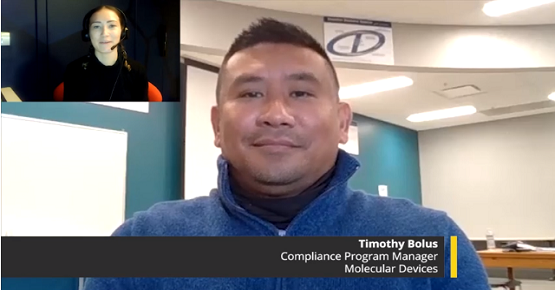

Compliance Made Simple: How GxP Solutions Are Changing Drug Development
Insider Insights with Tim Bolus
Meet the guy who’s making regulatory compliance a whole lot less intimidating.
With years of experience in the world of Good Practices (GxP) compliance, Tim has seen firsthand how complex (and high stakes) the drug development process can be. From navigating FDA regulations to ensuring data integrity across global research sites, he’s at the forefront of helping organizations simplify compliance while speeding up innovation.
In this post from our Insider Insights series—where experts share both their quick reactions and deep reflections on what it’ll take to prepare life scientists for what’s next—Tim explores how the right tools can unlock new opportunities in the fast-paced world of pharmaceutical development, whether it’s tackling the challenges of data management with automation and AI or driving global harmonization.
Inquiring minds want to know:
How have you seen the development of GxP compliance solutions impact or improve the everyday lives of our customers?
Quick reaction: I’m proud that we have been able to transform our software operational qualification (OQ) service from a very cumbersome process into a more efficient service offering.
Deep reflection: Compliance Assurance Services is a key pillar of our Compliance Portfolio, empowering customers in regulated environments to maintain the highest standards of data integrity and operational excellence. One standout innovation is our automated software qualification tool, which has drastically reduced the time required for functional testing of SoftMax® Pro GxP Software—from four days to under two hours. By automating formerly manual tasks like logging in and out of the GxP Admin Portal, capturing screenshots, and completing transcriptions, we’ve eliminated common pain points and freed up valuable time.
This is part of a broader transformation in how GxP compliance solutions support our customers. Tools like SoftMax® Pro GxP Software make data management faster and more reliable—streamlining workflows in pre-clinical development labs to those with focus on quality control that support commercial manufacturing. By shifting to digital (basic AI and/or machine learning) platforms, customers significantly reduce the risk of human error and discrepancies while improving traceability and efficiency across global operations. The result is not only better compliance, but also a smoother, more productive path to discovery.

INSTALLATION QUALIFICATION (IQ)
Verifies and documents all necessary components required for operation are received and properly installed in accordance with Molecular Devices installation protocols.

OPERATIONAL QUALIFICATION (OQ)
Tests every subsystem of the reader or washer including mechanical, electrical, and optical components to verify operating functions are in accordance to the Molecular Devices product operational specifications
PREVENTIVE MAINTENANCE (PM)
Each plate reader or washer is calibrated, inspected, and lubricated—any potential issues are proactively addressed. Our comprehensive multipoint inspection and testing ensures each microplate reader or washer meets our product operational specifications.
Why do you find this exciting?
Quick reaction: GxP compliance has evolved from a regulatory requirement into a strategic advantage, freeing teams to focus less on paperwork and more on progress.
Deep reflection: Innovation in quality and computer systems isn’t just a nice-to-have in regulated industries—it’s essential. While validation remains a required and often resource-intensive part of drug development, finding ways to streamline this work can significantly reduce overhead. Every efficiency gained is a step toward smarter automation, and ultimately toward realizing the potential of AI and machine learning in the regulatory space.
What excites me most is how the industry is navigating the frontiers of AI and machine learning as a strategic advantage. In an industry where the stakes are incredibly high and human lives are impacted, having a reliable, automated system that ensures data integrity and compliance is transformative. It’s not just about checking boxes, it’s about building trust, accelerating time to market, and freeing teams to focus on the innovation that truly drives progress. We’re seeing customers not only meet compliance standards but exceed them. And in doing so, they’re reshaping what’s possible in biotech.
What trends or customer feedback have driven innovation in this area?
Quick reaction: With the FDA’s shift toward Computer Software Assurance methodology, automation is redefining how validation gets done faster, smarter, and with less burden.
Deep reflection: Pharmaceutical companies and regulated labs are required under Title 21 of the Code of Federal Regulations to validate their systems. While the mandate to validate is clear, the regulations are intentionally non-descriptive about how to do it. Over the past few decades, the industry has worked to streamline common validation activities through Computerized Systems Validation (CSV) methodologies, and in collaboration with the FDA, is moving toward a more efficient, risk-based approach known as Computer Software Assurance (CSA). Automating qualification processes is a key step in applying CSA principles and reducing the time and effort of validation work.
This shift comes at a critical time. The rise in FDA warning letters and heightened regulatory focus on data integrity have intensified the demand for smarter, more reliable compliance solutions. Customers are no longer just looking to meet regulatory requirements—they’re seeking ways to optimize workflows, reduce redundancy, and maintain consistency across global operations. In response, innovations like harmonized global data repositories, real-time electronic signatures, and user-friendly platforms with built-in audit trails and granular access controls have become essential tools in modern compliance strategies. These advancements help ensure that no matter the location, teams operate under the same high standards, safeguarding data integrity while accelerating research.
What common research challenges do customers face now, and how can GxP compliance solutions open new opportunities?
Quick reaction: As drug developers prepare for BLA filings, validation must strike a critical balance, ensuring data integrity without slowing innovation.
Deep reflection: In the drug development lifecycle, the stage between early development and pre-clinical testing is a critical inflection point, especially for GLP (Good Laboratory Practice) regulated labs preparing to file Investigational New Drug (IND) or Biological License Applications (BLAs). At this stage, the integrity of data becomes a central focus, as the records generated will directly support regulatory submissions and determine whether a drug candidate can advance to clinical trials. Ensuring data is accurate, complete, and traceable is not just best practice, it’s a regulatory imperative.
As validation requirements begin to take hold in this phase, there’s a growing need for methodologies that are both rigorous and adaptable. Traditional validation approaches can be overly burdensome and slow, which can hinder progress and delay filings. To meet the demands of modern drug development, validation processes must support data integrity while remaining flexible enough to accommodate evolving technologies and workflows. This balance is essential for enabling innovation without compromising the quality or reliability of critical regulatory data.
In a world where GxP compliance solutions reach their full potential, what do you envision happens next?
Quick reaction: I envision a future where GxP compliance is seamlessly automated, freeing researchers to focus on innovation while ensuring the highest standards of product quality and safety.
Deep reflection: I’m cautiously optimistic about the growing role of artificial intelligence and machine learning in software development, particularly within regulated industries. Validating AI- and machine learning-capable software is uncharted territory for many regulatory agencies, and it’s critical that software vendors exploring these technologies also pursue innovative validation methodologies which uphold product quality and, ultimately, product safety to protect the biologics and pharmaceuticals we rely on for our health.
Looking ahead, I envision a future where fully optimized GxP compliance solutions make regulatory adherence almost invisible, built seamlessly into daily operations through intelligent automation and real-time monitoring. In this model, researchers can focus more on science and less on regulatory red tape, accelerating innovation and delivering novel therapeutics faster. As these systems evolve, they could also enable secure, cross-border data collaboration, fostering a more connected global research ecosystem and advancing medicine on a worldwide scale.
For more insights from Tim, check out his latest thought pieces:

The Science Explorer
Maintaining data integrity compliance in a regulated GxP environment

Technology Networks
Millions in FDA Fines and Thousands of Warning Letters



